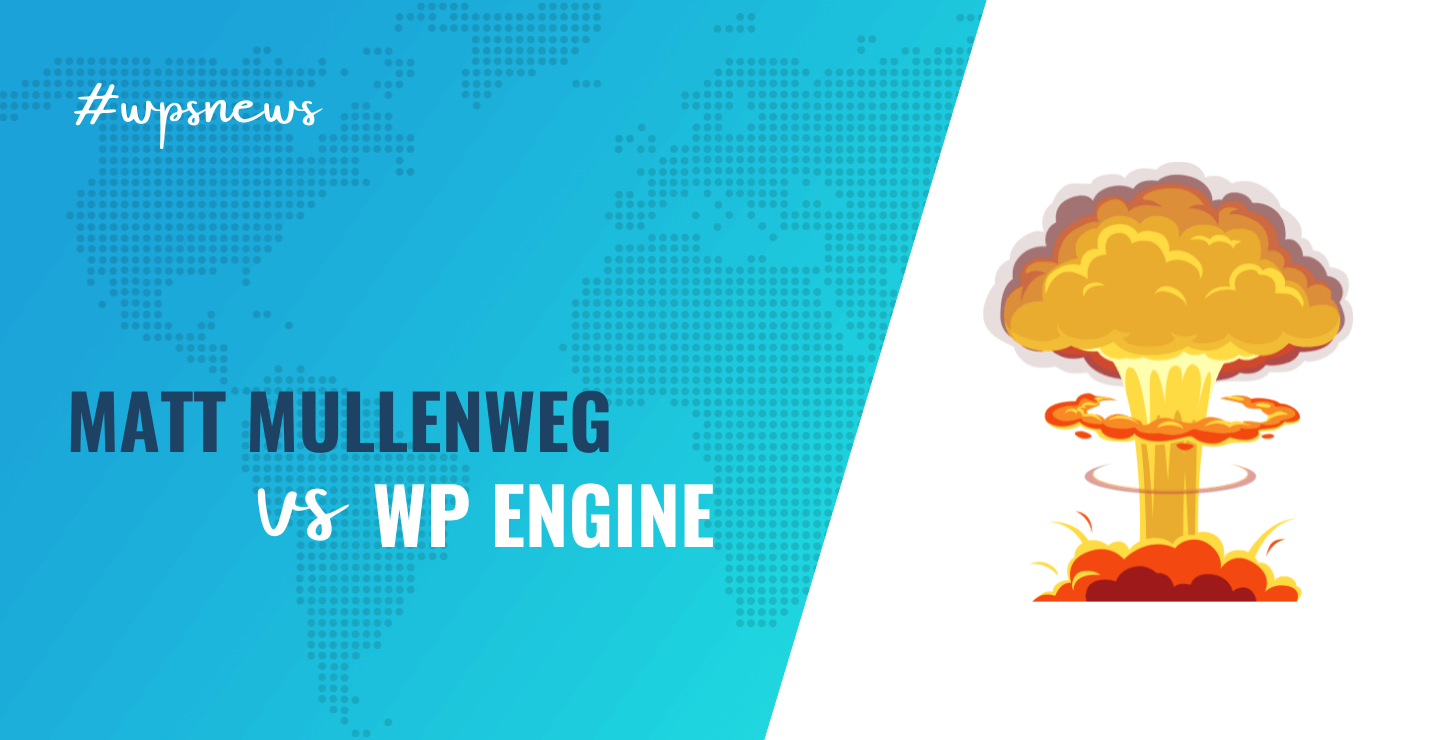WP Engine vs. Automattic: The Dispute Shaking Up the WordPress Ecosystem
At LevelUp Marketing Solutions, we always aim to provide our clients with the most reliable, cutting-edge digital solutions, but recent events in the WordPress world have highlighted some critical challenges within the hosting ecosystem. This blog post aims to shed light on the ongoing dispute between Automattic’s CEO Matt Mullenweg and WP Engine and what it could mean for businesses like ours. In the end, we’ll explain why none of our customers are hosted on WP Engine but instead on custom, privately managed servers tailored to our clients’ unique needs.
Brief Summary of the Beef
In recent months, Matt Mullenweg, co-founder of WordPress and CEO of Automattic, has been publicly critical of WP Engine, one of the largest managed WordPress hosting companies. Mullenweg’s criticisms have centered around WP Engine’s business practices, including its handling of core WordPress features. He’s accused WP Engine of disabling key features like revision histories to save on storage costs, thereby undermining WordPress’s open-source ideals. WP Engine fired back, claiming that Mullenweg’s attacks stemmed from a financial dispute over trademark usage, leading to a heated back-and-forth that has not only tarnished their relationship but also led to WP Engine’s exclusion from certain WordPress.org resources.
Who is Matt Mullenweg, and What is Automattic?
Matt Mullenweg is a name synonymous with WordPress, the most widely used content management system (CMS) on the web. He co-founded WordPress in 2003 and later formed Automattic, a company that oversees key WordPress projects, including WordPress.com, Jetpack, and WooCommerce. Mullenweg is an outspoken advocate for open-source software and the freedom it provides for users and developers alike.
Automattic itself is more than just a company—it plays a pivotal role in the WordPress ecosystem, helping to steer its future development. Through his leadership at Automattic, Mullenweg has helped shape the WordPress platform, emphasizing its open-source nature and community-driven progress.
Who is WP Engine, and What Do They Do?
WP Engine is a prominent player in the managed WordPress hosting market. They specialize in providing hosting solutions tailored specifically for WordPress websites, offering services such as speed optimization, security management, and developer tools. WP Engine has gained popularity for taking the hassle out of managing WordPress environments, particularly for businesses that want a plug-and-play solution without dealing with the technical side of web hosting.
However, their approach to hosting—while convenient—has been seen as restrictive by some, particularly due to their decision to disable or limit certain core WordPress functionalities, like revision histories, in an effort to save costs.
WordPress and Its Open-Source Foundation
To understand the crux of this conflict, it’s essential to appreciate what makes WordPress so powerful: it’s open source. Open-source software gives everyone the freedom to use, modify, and share the software freely. This has created a massive ecosystem of developers, designers, and businesses that contribute to and rely on WordPress.
One of the pillars of the open-source model is its emphasis on transparency and user control. When hosting providers like WP Engine make decisions that affect how WordPress functions, it can be seen as eroding these freedoms. Mullenweg’s stance is that such practices run counter to the open-source spirit, as they impose limitations that might not align with users’ best interests.
Why This Isn’t Fair
While Matt Mullenweg has voiced his concerns about WP Engine’s hosting practices, it’s important to consider things from WP Engine’s side as well. WP Engine has built a successful business by providing a premium, managed WordPress hosting experience tailored for businesses that want the performance, security, and scalability WordPress offers without needing to worry about the technical complexities of maintaining it.
Here are some reasons why WP Engine might feel that the criticism from Matt Mullenweg and Automattic isn’t fair:
- Cost-Effective and User-Focused Solutions
WP Engine operates in a competitive marketplace, and one of its main differentiators is its ability to provide high-performance hosting at scale. Features like post revisions, which are useful for content creators, can also significantly bloat databases on large sites. By limiting or disabling certain features, WP Engine isn’t undermining WordPress’s open-source ethos but rather offering a streamlined solution to its customers. These changes are made with the end-user in mind, helping to improve website speed and reduce costs for clients. For many businesses, these kinds of optimizations are welcomed rather than seen as limitations. - Meeting Enterprise Needs
Large-scale businesses and enterprises that use WP Engine often have very different needs from smaller WordPress users. WP Engine has tailored its platform for enterprises that require high-availability, dedicated support, and robust security—something not easily achievable with a more generalized, open-source approach. WP Engine’s modifications to WordPress allow it to serve these enterprise clients more effectively. For those businesses, disabling certain features may be a small trade-off for the peace of mind and support that WP Engine’s services provide. - Trademark Dispute – A Legal and Financial Matter
The financial dispute over WordPress trademark usage fees also plays a key role. WP Engine reportedly refused to pay millions of dollars in annual payments to Automattic for using the WordPress trademark. Since WordPress is an open-source project, WP Engine feels that charging exorbitant fees for using the WordPress name contradicts the open-source spirit and places undue financial strain on hosting providers. From WP Engine’s perspective, this dispute is more about Automattic’s desire to monetize the WordPress brand rather than about open-source principles. - WP Engine’s Contribution to the Ecosystem
WP Engine also plays an important role in the WordPress ecosystem. They employ hundreds of WordPress developers and have built a platform that makes WordPress accessible to large-scale businesses. WP Engine has contributed to the WordPress community by developing tools and providing educational content for WordPress users. It’s not that WP Engine is exploiting WordPress for profit—they are helping to expand its reach and usability for business owners who need robust, scalable solutions. - Freedom to Choose Hosting Based on Needs
The beauty of WordPress being open-source is that users are free to choose how and where they host their websites. WP Engine offers a premium service, and those who disagree with its business model have other hosting options. It’s unfair to demonize WP Engine for providing a tailored hosting solution that works for a specific audience. If users feel that WP Engine’s limitations aren’t for them, they are free to switch to a different provider, just as they have the freedom to select from a wide array of plugins and themes. - Protecting Clients from Complexity
The WordPress ecosystem can be overwhelming for some users, especially those who are not developers. WP Engine makes WordPress simpler for non-technical users by handling many backend tasks like security, caching, and updates. In some cases, removing features like post revisions could be seen as a way to streamline the experience for users who don’t need those features or who might inadvertently create issues with their sites. From this viewpoint, WP Engine is not taking away user control but instead offering a curated and efficient experience for their clients.
In summary, WP Engine’s practices are not about undermining WordPress’s open-source ethos but about meeting the specific needs of their user base—especially enterprise clients. They’ve built a platform designed to improve performance, security, and scalability while keeping WordPress accessible and easy to manage for large-scale businesses. By limiting certain features, they are optimizing the platform for their clients’ best interests. Moreover, the financial dispute over WordPress’s trademark fees adds another layer to the tension, which suggests that some of Mullenweg’s criticism may stem from broader business disagreements rather than purely open-source concerns.
For these reasons, WP Engine feels that the backlash isn’t entirely fair, as they continue to serve a specific segment of the WordPress community effectively.

Potential Issues for Other Hosting Companies
The fallout from this dispute could have broader implications for the hosting market. If WP Engine’s practices become normalized, other hosting providers might follow suit, limiting their users’ control over their WordPress environments in exchange for higher profits. This trend could set a dangerous precedent for how hosting companies interact with open-source software. The fear is that hosting companies might prioritize cost-cutting and profit-maximization over the user experience, leading to a degraded experience for WordPress users.
What About Companies Profiting from Developing Plugins?
For companies profiting from developing plugins, this dispute raises additional concerns. WordPress’s vast ecosystem of plugins relies on the platform remaining open, flexible, and user-friendly. If hosting providers start locking down core features or creating barriers to customization, it could stifle innovation. Developers could find it harder to integrate their products into WordPress, or users might not have the freedom to fully utilize the plugins they’ve invested in. This could hurt the businesses that depend on the WordPress ecosystem for their livelihood.
LevelUp Marketing Solutions: Our Custom Hosting Solutions
At LevelUp Marketing Solutions, we believe that the best way to support our clients and WordPress’s open-source ideals is through custom, privately managed hosting solutions. Unlike WP Engine, we don’t impose arbitrary restrictions on core WordPress features. We offer our clients complete control over their websites, ensuring that they can take full advantage of WordPress’s flexibility without sacrificing performance or security.
Our hosting environments are tailored specifically to each client’s needs. Whether you run a small business website or a large e-commerce platform, we ensure that your site is hosted on fast, secure, and reliable servers that give you full access to all of WordPress’s features. Most importantly, none of our clients are hosted on WP Engine, meaning you’re not subject to the kinds of restrictions or disputes that can limit your site’s functionality.
In conclusion, the dispute between Automattic and WP Engine highlights the importance of maintaining the open-source values that have made WordPress the go-to CMS for millions of users. At LevelUp Marketing Solutions, we’re committed to offering hosting solutions that respect these values while providing the best possible experience for our clients. Our customers enjoy the full flexibility of WordPress, hosted on custom, privately managed servers designed to meet their exact needs.

